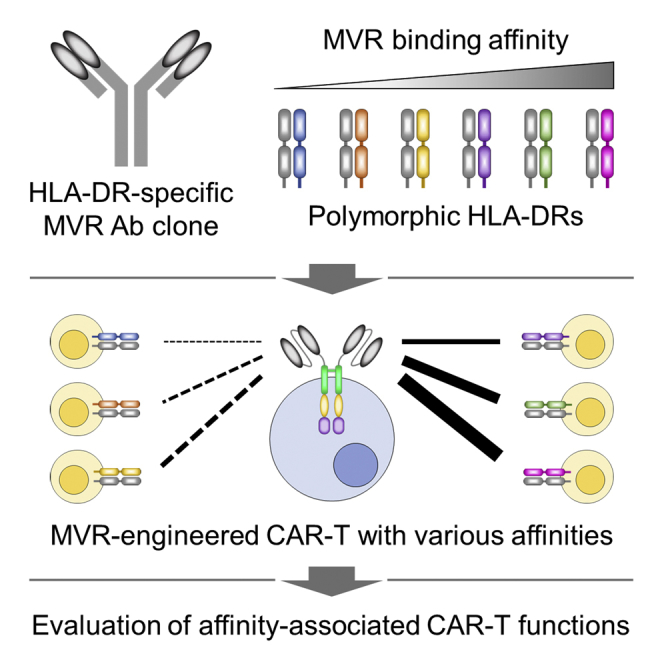Antibody purposes in most cancers immunotherapy contain various methods, some of which redirect T cell-mediated immunity through engineered antibodies. Affinity is a trait that’s essential for these methods, as optimum affinity reduces undesirable unwanted effects whereas retaining therapeutic operate.
Antibody-antigen pairs possessing a broad affinity vary are required to outline optimum affinity and to analyze the affinity-associated purposeful profiles of T cell-engaging methods akin to bispecific antibodies and chimeric antigen receptor-engineered T cells.
Here, we reveal the distinctive binding attribute of the developed antibody clone MVR, which reveals strong binding to B-lymphoid cell traces. Intriguingly, MVR particularly acknowledges the extremely polymorphic human leukocyte antigen (HLA)-DR complicated and reveals various affinities which can be dependent upon the HLA-DRB1 allele kind.
Remarkably, MVR binds to the conformational epitope that consists of two hypervariable areas. As an software of MVR, we reveal an MVR-engineered chimeric antigen receptor (CAR) that elicits affinity-dependent operate in response to a panel of goal cell traces that categorical totally different HLA-DRB1 alleles.
This instrument evaluates the impact of affinity on cytotoxic killing, polyfunctionality, and activation-induced cell demise of CAR-engineered T cells. Collectively, MVR reveals large potential for the analysis of the affinity-associated profile of T cells which can be redirected by engineered antibodies.

Measuring antibody avidity to Plasmodium falciparum merozoite antigens utilizing a multiplex immunoassay strategy.
Antibodies (Ab) play a big position in immunity to Plasmodium falciparum malaria. Usually, following repeated publicity to pathogens, affinity maturation and clonal choice happen, leading to elevated antibody avidity. However, some research counsel affinity maturation could not happen to malaria antigens in endemic areas.
Information on growth of antibody avidity is complicated and conflicting, partly, as a result of totally different strategies have been used to measure avidity. Today, bead-based multiplex immunoassays (MIA) are routinely used to concurrently quantitate antibody ranges to a number of antigens.
This research evaluated the feasibility of growing an avidity MIA with 5 merozoite antigens (AMA1, EBA-175, MSP1-42, MSP2, MSP3) that makes use of a single chaotropic focus.METHODSThe most typical ELISA protocols that used the chaotropic reagents guanidine HCl (GdHCl), urea, and ammonium thiocyanate (NH4SCN) had been tailored to a multiplex MIA format.
Then, totally different concentrations of chaotropes and incubation occasions had been in contrast and outcomes had been expressed as an Avidity Index (AI), i.e., proportion of antibody remaining sure within the presence of chaotrope.
Experiments had been carried out to (i) establish the assay with the widest vary of AI (discriminatory energy), (ii) decide the quantity of chaotrope wanted to launch 50% of sure Ab utilizing plasma from adults and infants, and (iii) consider assay repeatability.
RESULTSOverall, Four M GdHCl and eight M urea had been weaker chaotropes than three M NH4SCN. For instance, they didn’t launch vital quantities of Ab sure to MSP1-42 in grownup plasma samples; whereas, a spread of AI values was obtained with NH4SCN. Titration of NH4SCN revealed that 2 M NH4SCN gave the widest vary of AI for the 5 antigens.
Binding research utilizing plasma from 40 adults and 57 1-year outdated infants in Cameroon confirmed that 2.1 M ± 0.32 (imply ± SD) NH4SCN (adults) and 1.eight M ± 0.23 M (infants) launched 50% of sure Ab from the merozoite antigens.CONCLUSIONSAn avidity MIA is possible for the 5 merozoite antigens that makes use of a single focus (2 M) of NH4SCN.
The assay gives a easy technique to shortly get hold of details about Ab amount and high quality within the acquisition of immunity to malaria in endemic populations.

